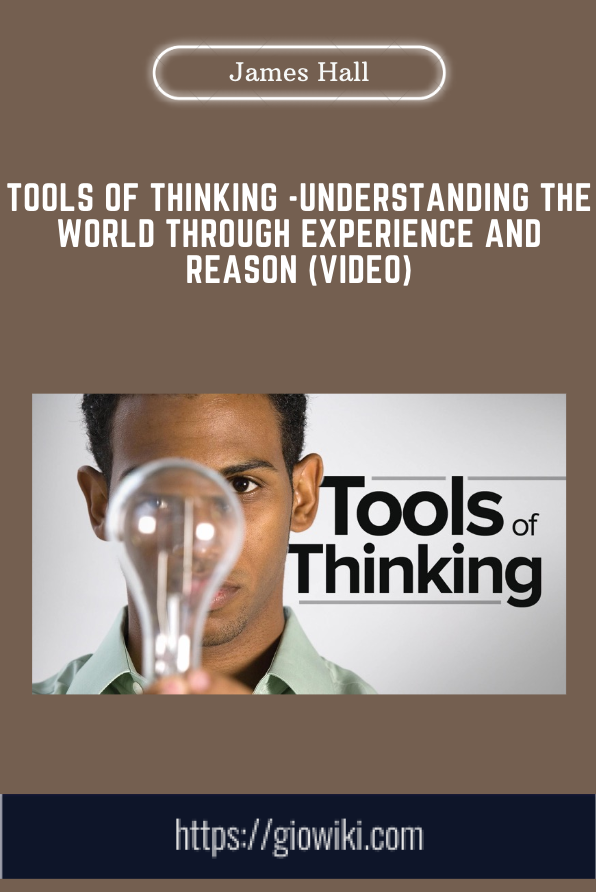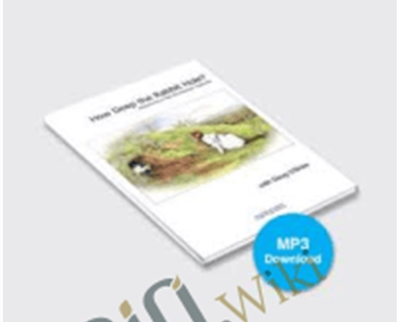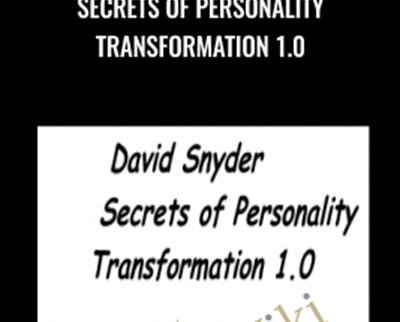Buy Tools of Thinking – Understanding the World Through Experience and Reason (Video) – James Hall, Ph.D Course at GBesy. We actively participate in Groupbuys and are committed to sharing knowledge with a wider audience. Rest assured, the quality of our courses matches that of the original sale page. If you prefer, you can also buy directly from the sale page at the full price (the SALEPAGE link is directly provided in the post).
Salepage link: At HERE. Archive: https://archive.is/Dybmx
$149 $39 – Tools of Thinking – Understanding the World Through Experience and Reason (Video) – James Hall, Ph.D
Course Overview
What is the best way to prove a case, create a rule, solve a problem, justify an idea, invent a hypothesis, or evaluate an argument? In other words, what is the best way to think?
Everyone has to think in order to function in the world, and this course will equip you with the tools to reason effectively in your pursuit of reliable beliefs and useful knowledge. Whether you are a budding philosopher searching for ultimate truths, a science student grappling with the nature of scientific proof, a new parent weighing conflicting child-rearing advice, or a concerned citizen making up your mind about today’s issues, Tools of Thinking will help you cut through deception and faulty reasoning to get closer to the essence of a matter.
In Tools of Thinking: Understanding the World through Experience and Reason, Professor Hall turns his friendly but intellectually rigorous approach to the problem of thinking, introducing you to a wide range of effective techniques.
24 Lectures
Average 30 minutes each
1What Are “Tools of Thinking”?
The “tools of thinking” are the devices and processes we use to achieve knowledge. This lecture introduces eight tools: experience, memory, association, pattern discernment and recognition, reason, invention, experimentation, and intuition.
2Which Tools of Thinking Are Basic?
Professor Hall discusses the eight tools of thinking in detail. Reason, experience, invention, and experimentation are particularly important, since we use them to create our languages and make our instruments of investigation.
3Platonic Intuition, Memory, and Reason
Plato subordinated sense experience to the tools of intuition, memory, and reason, believing that knowledge results from uncovering what the mind already knows intuitively.
4Intuition, Memory, and Reason—Problems
We explore some of the major problems with Plato’s reliance on intuition, memory, and reason. Even though Plato’s position makes good use of several basic tools of thinking, it is still inadequate.
5Sense Experience—A More Modern Take
What we see, taste, smell, feel, hear, and read can be unreliable. That means we must exercise great caution when we use such input as a basis for our thoughts.
6Observation and Immediate Inferences
Aristotle recognized the importance of observation. But his primary concern was with what one can rationally infer. This stimulated his interest in the processes and patterns of reason itself, and led to his systematic mapping of what we call logic.
7Further Immediate Inferences
We continue our investigation of Aristotle’s logic by looking at what more can be inferred from a single categorical proposition. The “square of opposition” is a powerful arrangement for analyzing immediate inferences that can be drawn from the truth or falsity of a single proposition.
8Categorical Syllogisms
A categorical syllogism consists of three categorical propositions: two premises and a conclusion. We learn how to place a categorical syllogism in “standard form” and how to analyze it in terms of “mood” and “figure.”
9Ancient Logic in Modern Dress
Some classes have no members; for example, the class of unicorns. This creates problems because we don’t always know whether a class is populated or not. We look at how developments by logicians George Boole and John Venn help deal with this issue.
10Systematic Doubt and Rational Certainty
We recapitulate some of the reasons for calling sense experience into question, in light of the “systematic doubt” of the 17th-century philosopher René Descartes.
11The Limits of Sense Experience
What content for thought does sense experience, by itself, provide? This lecture probes the views of David Hume, who argued that we have no sensations of causation as such, casting doubt on our ability to use inductive reasoning to gain demonstrable truths about the world.
12Inferences Demand Relevant Evidence
Inferences that rely on irrelevant “evidence” commit non sequitur in one form or another. In this lecture, we explore descriptions and examples of seven forms that such bad reasoning can take.
13Proper Inferences Avoid Equivocation
In relying on experiences as evidence for our inferences, we must avoid making unwarranted presumptions. Otherwise, we may be guilty of fallacies of presumption and ambiguity—eight examples of which are given.
14Induction Is Slippery but Unavoidable
After making a pragmatic assumption about the regularity of nature, we look at John Stuart Mill’s classic analysis of the inductive methods of agreement, difference, residues and concomitant variation. These are illustrated with examples to help clarify what induction can do and what it can’t.
15The Scientific Revolution
Focusing on the methods and ideas of Isaac Newton, we explore three factors that are essential for the generation of a prediction, which is the hallmark of modern science.
16Hypotheses and Experiments—A First Look
Irresponsible hypothesis construction is hard to distinguish from mere speculation. Responsible hypotheses are grounded in testing and experimentation. Hypotheses that are grounded and confirmed in this way generate covering laws.
17How Empirical Is Modern Empiricism?
Direct observations and inferences generated from them are possible at the macro level. However, a different kind of empirical link is required at the micro level where direct observation is impossible. In that case, hypotheses must be constructed and inferences from them need only be confirmed by empirical observation. This opens the door to theoretical imagination, creativity, and conceptual invention.
18Hypotheses and Experiments—A Closer Look
There are at least two uses for experiments that are of interest to modern rational empiricists. Some are aimed at discovering patterns that will help generate descriptive and explanatory knowledge. Others are aimed at testing the theories that we entertain, so as to confirm or disconfirm them.
19“Normal Science” at Mid-Century
In the middle of the 20th century, the vision of “normal science” was rooted in the movement called logical positivism, with contributions by logicians, mathematicians, scientists, and philosophers.
20Modern Logic—Truth Tables
Whether we hypothesize, discover, or create the mathematics, covering laws, and state descriptions that we use in explaining what we observe, we need a reliable apparatus for drawing inferences from them. This is provided by modern logic.
21Modern Logic—Sentential Arguments
We continue our examination of the techniques of modern logic used in complex derivations, with a look at replacement rules, such as DeMorgan’s theorems, and rules of inference, such as modus ponens.
22Modern Logic—Predicate Arguments
In contrast to sentential logic, which treats simple sentences as unanalyzed units, predicate logic involves the analysis of the internal structure of subject/predicate sentences. We look at the tools that allow us to solve predicate arguments far beyond the scope of Aristotelian syllogistic.
23Postmodern and New-Age Problems
Modern rational empiricism is not problem-free. For instance, we know that observations themselves are theory laden. Further, if the general culture determines what those ideas and theories are, then even our simplest descriptions are culturally relative. These are central themes of postmodernism.
24Rational Empiricism in the 21st Century
The tools of thinking are available to all. There are useful places to put them to use if we will spend the efforts to master them. The systematic study of logic, science, mathematics, history, and even philosophy, are all good places to start.
Get Tools of Thinking -Understanding the World Through Experience and Reason (Video) – James Hall, Ph.D, Only Price $39
Tag: Tools of Thinking -Understanding the World Through Experience and Reason (Video) – James Hall, Ph.D Download, Tools of Thinking -Understanding the World Through Experience and Reason (Video) – James Hall, Ph.D review, Tools of Thinking -Understanding the World Through Experience and Reason (Video) – James Hall, Ph.DDiscount, understanding the world through experience, how do you understand how the world works, how to understand the world around you, understanding our world, experience of the inner worlds pdf.
$149 $39 – Tools of Thinking – Understanding the World Through Experience and Reason (Video) – James Hall, Ph.D
Buy the Tools of Thinking – Understanding the World Through Experience and Reason (Video) – James Hall, Ph.D course at the best price at GBesy.. After your purchase, you will get access to the downloads page. You can download all the files associated in your order at here and we will also send a download notification email via your mail.
Unlock your full potential with Tools of Thinking – Understanding the World Through Experience and Reason (Video) – James Hall, Ph.D courses. our courses are designed to help you excel.
Why wait? Take the first step towards greatness by purchasing Tools of Thinking – Understanding the World Through Experience and Reason (Video) – James Hall, Ph.D courses today. We offer a seamless and secure purchasing experience, ensuring your peace of mind. With our trusted payment gateways, Stripe and PayPal, you can confidently complete your transaction knowing that your financial information is protected.
Stripe, known for its robust security measures, provides a safe and reliable payment process. With its encrypted technology, your sensitive data remains confidential throughout the transaction. Rest assured that your purchase is protected.
PayPal, a globally recognized payment platform, offers an additional layer of security. With its buyer protection program, you can feel confident in your purchase. PayPal ensures that your financial details are safeguarded, allowing you to focus on your learning journey.
Is it secure? to Use of?
- Your identity is completely confidential. We do not share your information with anyone. So it is absolutely safe to buy the Tools of Thinking – Understanding the World Through Experience and Reason (Video) – James Hall, Ph.D course.
- 100% Safe Checkout Privateness coverage
- Communication and encryption of sensitive knowledge
- All card numbers are encrypted using AES at relaxation-256 and transmitting card numbers runs in a separate internet hosting atmosphere, and doesn’t share or save any data.
How can this course be delivered?
- After your successful payment this “Tools of Thinking – Understanding the World Through Experience and Reason (Video) – James Hall, Ph.D course”, Most of the products will come to you immediately. But for some products were posted for offer. Please wait for our response, it might take a few hours due to the time zone difference.
- If this happens, please wait. The technical department will process the link shortly after. You will receive notifications directly by e-mail. We appreciate your wait.
What Shipping Methods Are Available?
- You will receive a download link in the invoice or YOUR ACCOUNT.
- The course link always exists. use your account to login and download the Tools of Thinking – Understanding the World Through Experience and Reason (Video) – James Hall, Ph.D course whenever you need.
- You only need to visit a single link, and you can get all the Tools of Thinking – Understanding the World Through Experience and Reason (Video) – James Hall, Ph.D course content at once.
- You can do your learning online. You can be downloaded for better results and can study anywhere on any device. Make sure your system does not sleep during the download.
How Do I Track Order?
- We always notice the status of your order immediately after your payment. After 7 days if there is no download link, the system will automatically complete your money.
- We love to hear from you. Please don’t hesitate to email us with any comments, questions and suggestions.
![GBesy [GB] GBesy [GB]](https://www.gbesy.com/wp-content/uploads/2023/05/gbesy-Logo-full-100.png)

![[Audio] EP13 Point/Counter Point 02 - Psychotherapy’s Evolution: Beyond Pathology into the Landscape of Living - Erving Polster](https://www.gbesy.com/wp-content/uploads/2023/07/Audio-Only-EP13-Point-Counter-Point-02-Psychotherapys-Evolution-Beyond-Pathology-into-the-Landscape-of-Living-Erving-Polster-PHD.png)

 Purchase this course you will earn
Purchase this course you will earn 





Reviews
There are no reviews yet.